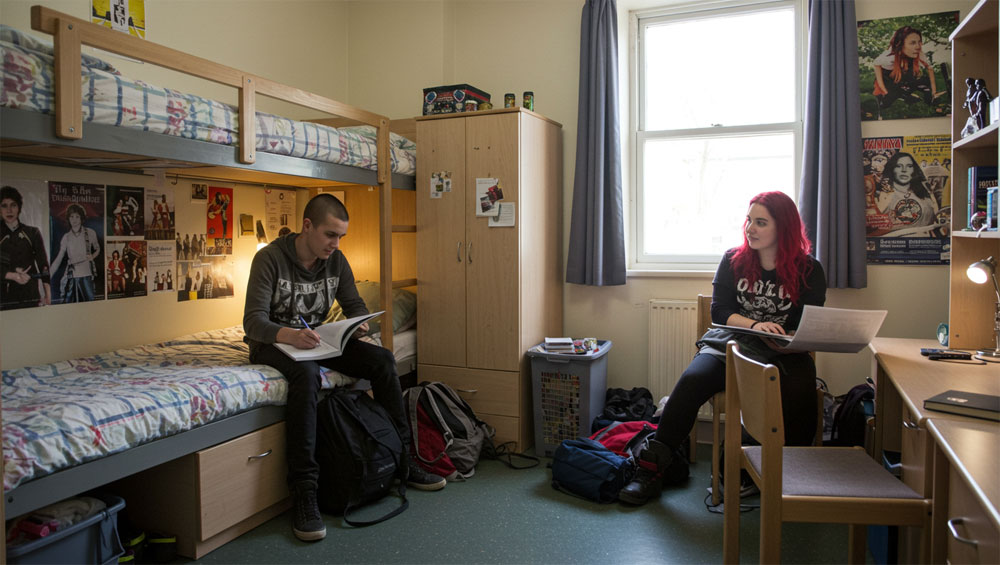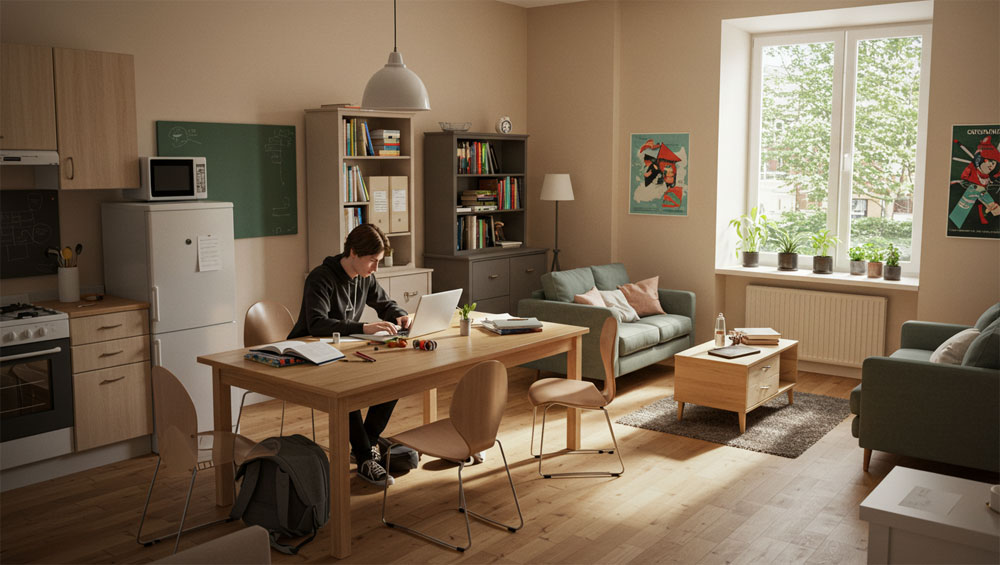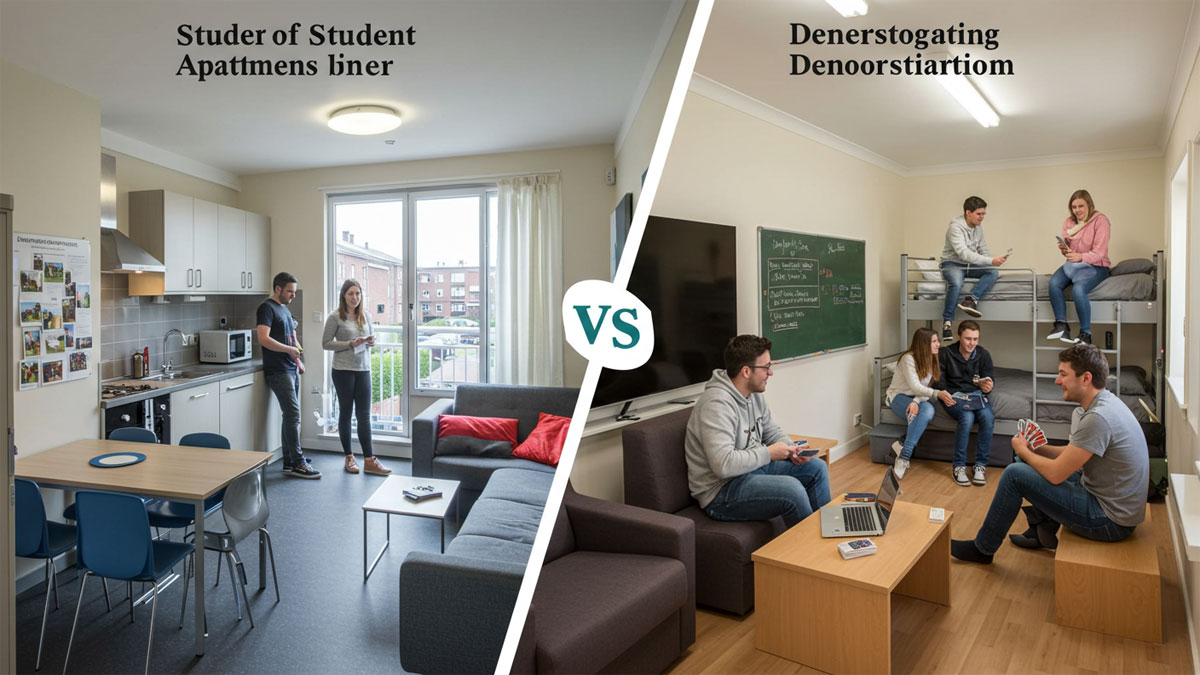Student housing is a critical aspect of college life, influencing budget, social experience, and daily routine. The choice between a student apartment and a dormitory depends on factors such as cost, convenience, and personal preferences. While dorms offer a community-oriented environment, apartments provide more independence. Understanding the pros and cons of each can help students make informed housing decisions.
Finding the best student housing option
Choosing between student apartments and dormitories is a significant decision for students, especially in cities like Toronto, where rent and availability are key considerations. Both options offer unique advantages and potential downsides. While dormitories provide a structured environment with a social atmosphere, student apartments offer independence and privacy. This guide will help you weigh the pros and cons of each option so you can make the best decision for your living situation.
Cost comparison & which is more affordable?
Affordability plays a crucial role when selecting student housing, as rent and living costs vary significantly. Dormitories typically provide a fixed-cost option with bundled utilities, reducing financial unpredictability. Student apartments, on the other hand, offer flexible pricing but often come with additional expenses. Evaluating total costs, including utilities and meal plans, is essential for budgeting.
Dormitories & fixed costs and included utilities
Dormitories are often considered the more affordable option because they come with fixed costs. Most university dorms include rent, utilities, and sometimes meal plans in one payment. This predictability helps students budget efficiently without worrying about fluctuating expenses like electricity or internet bills. Additionally, dormitories often require minimal upfront costs compared to apartments.
Flexible pricing but additional expenses
Student apartments, whether for rent or sale in Toronto, offer more variety in pricing. However, additional costs such as utilities, internet, and groceries can make the overall expenses higher than dormitory living. Rent prices can vary based on location, amenities, and demand. Students who choose apartments should carefully calculate their expenses to avoid financial strain.

Privacy and personal space
Privacy is an essential consideration for students when choosing between a dormitory and an apartment. Dorms often involve shared spaces, with limited control over noise and personal boundaries. Student apartments, however, provide greater privacy with separate bedrooms and bathrooms. Those who value solitude and personal space may find apartments a better fit.
Dormitories, shared spaces with minimal privacy
Living in a dormitory means sharing a room with at least one other student and using communal bathrooms and study areas. While this fosters social connections, it can be challenging for students who value privacy and a quiet environment. Dormitory life can also mean limited control over personal space, making it harder to focus on studies at times.
Student apartments, more personal space
A student apartment provides more privacy, with options for private bedrooms, kitchens, and bathrooms. If you prefer a quieter space to focus on your studies, renting or buying an apartment in Toronto might be a better choice. Apartments allow students to create their own environment, free from the restrictions of shared dormitory living.
Location and convenience
Proximity to campus and city amenities greatly affects a student’s daily routine and lifestyle. Dormitories are usually located within or near campus, allowing quick access to classes and university facilities. Student apartments, while offering more location options, may require commuting. Weighing accessibility against lifestyle preferences is key in making the right choice.
Dormitories and on-campus benefits
Dormitories are usually located on campus, making it easier to attend classes, access university resources, and engage in student activities. The close proximity can save time and money on transportation. Additionally, being near academic buildings means students have quick access to libraries and study centers.
Student apartments and diverse location options
Renting an apartment gives students the freedom to choose their preferred neighborhood. Whether looking for apartments for rent near downtown Toronto or quieter suburban areas, students can select a location that best suits their lifestyle and budget. Some students prefer to live closer to entertainment, shopping, and job opportunities, which apartments can provide.

Social experience and community living
Social interactions play a crucial role in shaping the college experience. Dormitories provide a built-in community, making it easier to connect with peers through shared living spaces and events. Student apartments offer a more selective social environment, allowing students to control their interactions. The choice depends on whether a student thrives in a communal setting or prefers independence.
Dormitories and built-in social network
One of the main advantages of dormitory life is the built-in community. Students have the opportunity to meet new people, participate in dorm events, and create lifelong friendships. However, dorm life can sometimes be overwhelming for those who prefer solitude. The constant presence of peers may lead to distractions that affect academic performance.
Student apartments and independence with selective socializing
Living in a student apartment allows more control over social interactions. While it may take extra effort to meet new people compared to a dormitory, students can still engage with roommates and local communities in their apartment building. This flexibility allows students to choose when and how they interact with others.
Responsibilities and lifestyle flexibility
The level of responsibility required for student housing varies between dorms and apartments. Dormitories typically have maintenance and meal services, reducing the need for independent management. In contrast, student apartments demand more responsibility, such as rent payments, cooking, and general upkeep. Those who seek a structured lifestyle may prefer dorms, while independent students might find apartments more appealing.
Structured environment with rules at dormitories
Dorms come with rules regarding curfews, visitor policies, and quiet hours. While these regulations can be beneficial for maintaining order, they may feel restrictive to some students. The structured nature of dormitories can help students develop discipline but may not suit those who prefer more autonomy.
Greater independence at student apartments
Apartment living offers more freedom regarding guests, noise levels, and lifestyle choices. However, with this independence comes the responsibility of managing rent payments, grocery shopping, and general upkeep. Students who opt for apartments must be prepared for adult responsibilities, including handling maintenance issues.

Lease agreements and long-term commitments
Commitment duration is an important factor in housing decisions. Dormitories usually have short-term agreements, aligning with academic schedules and reducing long-term obligations. Student apartments typically require a year-long lease, which offers stability but less flexibility. Students should assess their future plans and need for commitment before signing any housing contract.
Dormitories: short-term commitment
Most dormitory contracts are for an academic year, making it a flexible option for students who may not want long-term commitments. Additionally, dorms eliminate the hassle of dealing with landlords and lease agreements. This flexibility can be beneficial for students who are uncertain about their long-term housing plans.
Student apartments: long-term leases
Renting an apartment often requires signing a lease, usually for one year. While this provides housing stability, breaking a lease can be challenging and may involve additional fees. Students looking to buy an apartment in Toronto should consider their long-term plans before making a purchase. Leasing agreements should be carefully reviewed before committing.
Which option is right for you?
Choosing between a student apartment and a dormitory depends on personal preferences, budget, and lifestyle. Dormitories offer affordability, convenience, and a built-in social environment, while student apartments provide independence, privacy, and flexibility. If you are considering Toronto rent options, weigh the pros and cons carefully to find the best fit for your academic journey.





